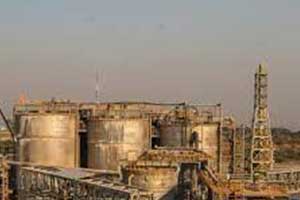
Posted on : Monday , 11th August 2025

Tanzania has opened its first state-of-the-art copper processing plant in Chunya District, Mbeya Region, marking a dramatic turn towards industrial self-reliance. This breakthrough not only represents progress but also a daring reevaluation of Tanzania's position in the global resource economy.
This facility is revolutionizing the nation's copper value chain and bringing it into line with the need for clean energy technologies worldwide. Mineral Access Systems Tanzania Ltd. (MAST), a locally held company, is in charge of it. It's more than just a building; it represents financial aspirations.
MAST, which was founded in 2011, has been a major participant in the East and Southern African mineral trade, concentrating on important minerals like manganese, nickel, and copper. Its prior expertise in South Africa, Zimbabwe, Zambia, and the Democratic Republic of the Congo enabled this historic endeavor. After ten years of strategic partnerships with small-scale miners and regional stakeholders, the company has established its most transformative presence in Chunya, where it has built tangible industrial infrastructure. The Chunya plant, which utilizes cutting-edge leaching and cementation methods to transform low-grade copper ore into copper cement with up to 75% purity, was constructed through a joint investment of more than US$10 million with its partner MCC, located in New York.
It can process 31,200 tonnes of copper ore per month, of which 4,000 come from Tanzanian small-scale miners. Artisanal miners who have been working on the periphery of formal economic systems for decades now have a lifeline thanks to this inclusive strategy. They are now suppliers to a high-tech establishment that integrates them into the formal economy and pays them more fairly.
It is difficult to exaggerate the importance of this model. MAST's inclusive supply chain provides both economic empowerment and a formalization framework in a nation where small-scale mining has historically been neglected and underregulated.
"We are establishing a stable local market for miners on a small scale. A top firm official stated, "This not only helps formalize an important sector that has traditionally operated in the informal space, but it also empowers communities economically." In many respects, it stands as part of a national endeavor to recover the mining story, which has historically been dominated by raw exports and little local value.
The district of Chunya, which is well renowned for its gold mines, is undergoing relocation. Of the 254 employment already produced by the plant, 205 have gone to Tanzanians, primarily from the Mbeya Region. The second phase of expansion aims to double the workforce, with a target of 500 employees, 95% of whom will be Tanzanian. Anchoring economic value in the source of the resources is more important than merely looking at numbers.
The promise of value addition is also starting to show in government income. Chunya District Council alone received more than TZS 9 million in taxes on the initial shipment of only 200 tonnes of copper cement, which generated TZS 228 million. As the factory expands, these figures should rise rapidly and support both local and national budgets, which has long been an aim in Tanzania's mining industry, where raw exports frequently leave nothing behind.
Taking social responsibility seriously goes beyond economics at MAST. The corporation has made it easier for people and commodities to move throughout the mining zone by repairing six kilometers of village roads and constructing an additional eleven kilometers. In order to promote social cohesion and development in the local communities, it has also donated sporting goods to young people.
Plans for replication have already been started. MAST plans to open three further beneficiation plants in Dodoma, Mbesa, and Simanjiro. It is anticipated that each factory will generate over 500 employment and contribute over US$40 million to the economy annually. These facilities have the potential to have a significant impact on Tanzania's industrial landscape, particularly given their integration with local economies and communities.
The economic policy of Tanzania's Sixth Phase Government, led by President Samia Suluhu Hassan, is centered on domestic value addition and industrialization. Chunya's copper plant is an early example of these rules in action. The administration has given top priority to measures that boost investor confidence, control unfair business practices, and encourage beneficiation. In an indication of growing investor interest, four licenses for copper processing facilities in Tanzania, Chunya, Dar es Salaam, Iringa, and Lindi have been granted as of May 2025.
Although this success story is encouraging, it raises questions about Tanzania's difficulty with resource industrialization after gaining independence. Since attaining independence in 1961, the nation has seen several waves of industrialization, each with differing levels of sustainability and success.
For instance, the 1967 Arusha Declaration sought to give Tanzanians control over the means of production, but state-led companies frequently failed because of inadequate finance, inadequate management, and a lack of technology. Critics warn that history could repeat itself if structural improvements are not made. The copper plant's environmental sustainability and the long-term economic feasibility of such initiatives in volatile international markets are still up for debate.
Expogroup is a full service exhibition organiser with over eighteen years experience in International.Trade Exhibitions and Events. Our current portfolio includes 20 annual exhibitions from a diverse range of industries being held across the Middle East & Africa.
EXPOGROUP © 1996 - 2025 | Privacy PolicyJoin our mailing list and receive latest news and advice from us in our monthly Newsletter
Yes, I would like to receive Expogroup E-newsletters
